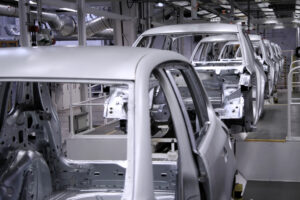British and European leaders have just weeks to save the car industry from the “devastating” impact of a no-deal Brexit, carmakers from across the continent have warned.
Automotive groups from the UK and the rest of the European Union have joined forces to demand negotiators “pull out all the stops” to prevent Britain reverting to World Trade Organisation (WTO) rules from the start of next year.
Jobs will be lost and car prices will rise if border tariffs are imposed, the 23 groups warned in a joint statement. Over five years, the cost to the industry would be €110 billion, they said.
The intervention came after last week’s stand-off, which caused a sharp fall in the pound on fears of a breakdown in negotiations. The renewed tension was sparked by UK legislation that would overturn last year’s Withdrawal Agreement. Brussels responded by threatening legal action if the proposals are not withdrawn.
Automotive manufacturing would be one of the hardest hit industries in a WTO deal because tariffs of 10 per cent would imposed on cars, rising to as high as 22 per cent on vans and trucks. Border controls would also threaten to disrupt just-in-time supply chains.
“Such tariffs — far higher than the small margins of most manufacturers — would almost certainly need to be passed on to consumers, making vehicles more expensive, reducing choice, and impacting demand,” the industry bodies said. “Without a deal . . . economies and jobs on both sides of the channel are at risk.”
The organisations warned that the deadline is tighter than the 15 weeks left before the transition period ends on December 31. A framework needs to be agreed in the coming weeks because businesses will need to prepare for any new trading conditions, they said.
A study by the Society of Motor Manufacturers and Traders (SMMT), the UK trade body, estimated that for cars and vans alone, a hit to demand caused by a 10 per cent tariff could reduce production by three million vehicles over five years, costing UK factories €52.8 billion and EU plants €57.7 billion. Suppliers would face additional losses, undermining an industry that accounts for a fifth of global car production and is one of Europe’s most valuable assets.
Any harm from a no-deal Brexit would compound difficulties the industry is already facing from coronavirus, which caused production line shutdowns and pushed even the major companies such as Jaguar Land Rover to the brink.
In July, the SMMT said that 11,349 jobs had been cut from the industry this year as production fell 43 per cent in the first half to its lowest level since 1954.
Foreign carmakers have warned that they will pull back from the UK in a no-deal Brexit. In June, Nissan said the viability of its Sunderland plant depended on tariffs remaining unchanged and Hildegard Müller, president of VDA, the German car association, hinted at withdrawal from the UK by German carmakers in the joint statement.
Higher tariffs “would jeopardise closely linked value chains and possibly make them unprofitable”, he said. He pointed out that “our member companies have more than 100 production sites in the UK”.
Mike Hawes, SMMT chief executive, said: “These figures paint a bleak picture of the devastation that would follow a ‘no deal’ Brexit. The shock of tariffs and other trade barriers would compound the damage already dealt by a global pandemic and recession, putting businesses and livelihoods at risk.”
A government spokesman said that policy is to secure a trade deal with the EU.
